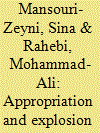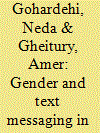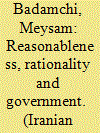|
|
|
Sort Order |
|
|
|
Items / Page
|
|
|
|
|
|
|
| Srl | Item |
| 1 |
ID:
132102


|
|
|
|
|
| Publication |
2014.
|
| Summary/Abstract |
The two of us wrote Anti-Oedipus together. Since each of us was several, there was already quite a crowd.
-Deleuze and Guattari, A Thousand Plateaus
With the linguistic turn came an ever-increasing tendency to see language as the locus where truths are born, passed along, or modified. As such, postmodern theories have proved highly compatible with postcolonial studies, which have inspired studies of modern Iran as a country that was colonized, only not officially. However, the latter seem to have fallen for extreme abstraction where metaphysical claims abound: presuming constructivist views of language but failing to present a tangible framework, these studies discuss "discursive change" without giving a clue as to what either discourse or change is. Convinced as such, we have adopted Wittgenstein's idea of language-games to present a tangible model for discursive change.
|
|
|
|
|
|
|
|
|
|
|
|
|
|
|
|
| 2 |
ID:
132096


|
|
|
|
|
| Publication |
2014.
|
| Summary/Abstract |
This article looks at the negotiations leading up to the Persian Tobacco Régie of 1890 as well as a previous failed Tobacco Régie in 1886. There exist only a few allusions to these two phases of the tobacco concession in the existing literature. Due to the newly uncovered diaries of the main commercial intermediary in these negotiations, the present article will be able to retrace, with precision, the events leading up to this economic concession of historical significance.
|
|
|
|
|
|
|
|
|
|
|
|
|
|
|
|
| 3 |
ID:
132101


|
|
|
|
|
| Publication |
2014.
|
| Summary/Abstract |
Focusing on four linguistic domains, purpose/manner of communication, preferring local dialects, politeness, and volume of use, this study aims to explore how gender is reflected in messages produced by Iranian female and male students. A corpus of 2,116 text messages was analyzed. Participants also filled out a questionnaire on how frequently they used text messaging. Results indicated females to be more prolific users of messaging. As far as function is concerned, while texts produced by females were for the most part relational, involving an emotional language, males frequently employed messages for informative-transactional functions which were less wordy and in more authoritative language. In addition, males were more likely than females to employ their local dialect and forms considered less polite.
|
|
|
|
|
|
|
|
|
|
|
|
|
|
|
|
| 4 |
ID:
132104


|
|
|
|
|
| Publication |
2014.
|
| Summary/Abstract |
This article is concerned with ways in which grotesque corporeality shapes Sadeq Chubak's controversial novel The Patient Stone (Sang-e Sabur, 1966). Drawing on Mikhail Bakhtin's understanding of grotesque realism in Rabelais and His World, the discussion demonstrates that Chubak employed devices associated with grotesque aesthetics, and that these devices were used to invert and contest social and literary conventions in Iranian culture, although it seems he remains caught to a certain extent within the very systems he challenges. Grotesque realism involves estrangement of the familiar, and leads to degrading the abstract, spiritual and sublime to the material level of physicality and the body. In The Patient Stone, Chubak replicates motifs of classical Persian epics, religious scriptures and the myth of creation and debases them by excessive depictions of bodily conditions and grotesque corporeality (such as deformity, paralysis and decay). The use of grotesque corporeality embodied in the style, content and characters of Chubak's novel facilitates a variety of paradoxes of being and non-being, appearance and reality, death and rebirth, hope and anxiety of a fragmented and alienated society in desperate need of change.
|
|
|
|
|
|
|
|
|
|
|
|
|
|
|
|
| 5 |
ID:
132097


|
|
|
|
|
| Publication |
2014.
|
| Summary/Abstract |
Rawls formulates liberalism according to two conceptions of reasonable and rational, which, tied to two particular notions of society and person, define the basis of liberalism in Rawlsian thought. This article argues that Mehdi Haeri Yazdi's important work, Hekmat va Hokumaat, should be considered as a work of liberal theory, and shows how it endorses liberal conceptions of the reasonable and the rational. The main elements of Ha'eri's liberalism are his thesis that philosophy has priority over jurisprudence, his doctrine of contract based upon concepts of agency contract (aqd-e vekalat) and joint private ownership (malekiyat-e shakhsi-ye musha), and his defense of individualism against the alleged collectivism of Rousseau.
|
|
|
|
|
|
|
|
|
|
|
|
|
|
|
|
| 6 |
ID:
132106


|
|
|
|
|
| Publication |
2014.
|
| Summary/Abstract |
The major foreign concessions granted in the reign of Nasser al-Din Shah Qajar have received considerable attention, none more so than the Tobacco Rebellion, which is generally viewed as a watershed event in the awakening of political consciousness in Iran. Although mentioned in most of the published material on the precedents of the Constitutional Revolution of 1906, a revised narrative of the tobacco rebellion is overdue. This paper fills the gaps and revises some of the widely held assumptions on the forces that unleashed a nationwide movement that almost brought down the Qajar dynasty. The emphasis is on the incendiary protests in Tabriz and the largely neglected role of Hajj Kazem Malek-al-Tojjar. This article, which is the fifth of a series by the author on the two Malek-al-tojjar-e mamalek-e mahrusa of the Qajar era, questions the authorship of the fatwa (hokm) and re-assesses the motivation for its hasty proclamation and dissemination. In other words, were the "sensation-seekers" the heroes of reform or is there a neglected version to extricate from the truths and half-truths propounded about this watershed event?
|
|
|
|
|
|
|
|
|
|
|
|
|
|
|
|
|
|
|
|
|